
Confidence building after 40 is practical and learnable. You’re not starting from scratch—you’re building on decades of lived experience, strengths, and values clarity.
As bodies, careers, and relationships shift, so does identity. Here’s the good news: with small, consistent actions, you can rebuild self-esteem, strengthen resilience, and shape a midlife reinvention that feels authentic.
What we’ll cover
- Daily rituals, posture, and breathwork you can start today
- Handling career pivots, ageism, and networking with purpose
- Building body confidence through strength training, mobility, and sleep hygiene
- Psychology tools: CBT, self-compassion, and updating limiting beliefs
- Fast, situational confidence boosts for high-stakes moments.
Is It Possible to Gain Self-Confidence in Your 40s?
Absolutely. Confidence building after 40 often accelerates once you align habits with your current season of life—perimenopause or menopause, the empty-nest phase, or a career change. You’re not “too late”; you’re better resourced and more self-aware.
Why confidence can dip—and how that’s normal
- Midlife transition: shifting roles, caregiving, and identity shifts can rattle self-esteem.
- Body image & energy: hormonal changes affect sleep, mood, blood sugar, and motivation; posture and mobility often need attention.
- Workplace signals: subtle ageism, unclear job descriptions, and impostor syndrome can undermine self-efficacy in interviews or new roles.
Why confidence often rebounds
- Clearer values and stronger boundaries reduce people-pleasing.
- A deeper skills inventory reveals transferable skills you can leverage.
- Better support systems—mentors, peers, and therapy—shorten the learning curve.
Mindset shifts that help right away
- Progress over perfection: track small wins to rebuild self-efficacy.
- Name the season: label stressors (perimenopause, job search, career pivot) so you can choose targeted tools—CBT, mindfulness, or physical activity.
- Rewrite the story: replace limiting beliefs (“I’m behind”) with grounded reframes (“I’m experienced and learning a new playbook”).
Quick actions this week
- Book a check-in with a health professional about sleep and energy levels.
- Do a 10-minute posture routine daily; add a gentle walking block to anchor mood.
- Start a 3-line journaling habit: win, lesson, next step.
- Update your LinkedIn headline to reflect your personal brand and career pivot.
Daily Habits That Boost Confidence After 40
Daily routines are powerful anchors for confidence-building after 40. Small actions practiced consistently rewire your self-talk, posture, and energy levels. You don’t need hours each day—just simple, repeatable habits that gradually strengthen self-esteem.
Morning Rituals for a Confident Start
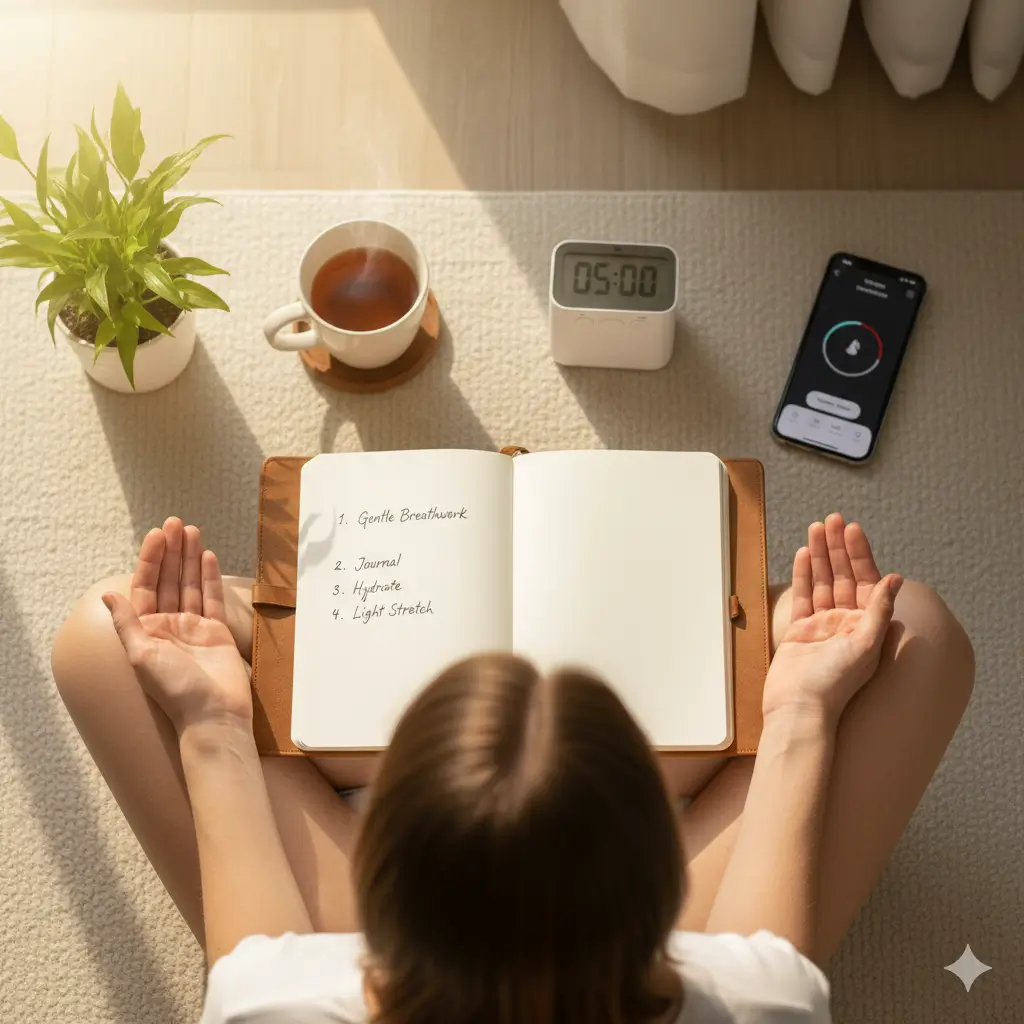
- Affirmations in the mirror: “I am capable, resilient, and focused.”
- Breathwork (box breathing 4-4-4-4) to regulate stress and stabilize blood sugar.
- Posture reset: stand tall, shoulders back—physical activity supports mental confidence.
- Gratitude journaling: write three quick notes—one about your health, one about relationships, one about progress.
Weekly Wins & Tracking Progress
- Set one micro-goal weekly (e.g., complete 2 strength sessions, finish one online course, attend one networking call).
- Record it in a simple tracker or phone note.
- Celebrate small wins; momentum is built, not gifted.
- Review progress monthly—it highlights growth when impostor syndrome creeps in.
Quick Confidence Hacks
- Power posing for two minutes before important calls.
- Grounding technique: press feet into the floor, name five things you see, four you feel, three you hear.
- Vocal warm-ups to project assurance.
- Visualization: imagine your future self who has already succeeded.
These habits compound. Over weeks, they shift self-esteem and keep you grounded during the unpredictable phases of midlife reinvention.
Rebuilding Self-Esteem After Career Changes
Career transitions are one of the biggest triggers for dips in confidence building after 40. Whether you’ve faced redundancy, chosen a new path, or feel stuck in a role that no longer fits, midlife offers both challenges and fresh opportunities.
Restarting Your Career in Your 40s
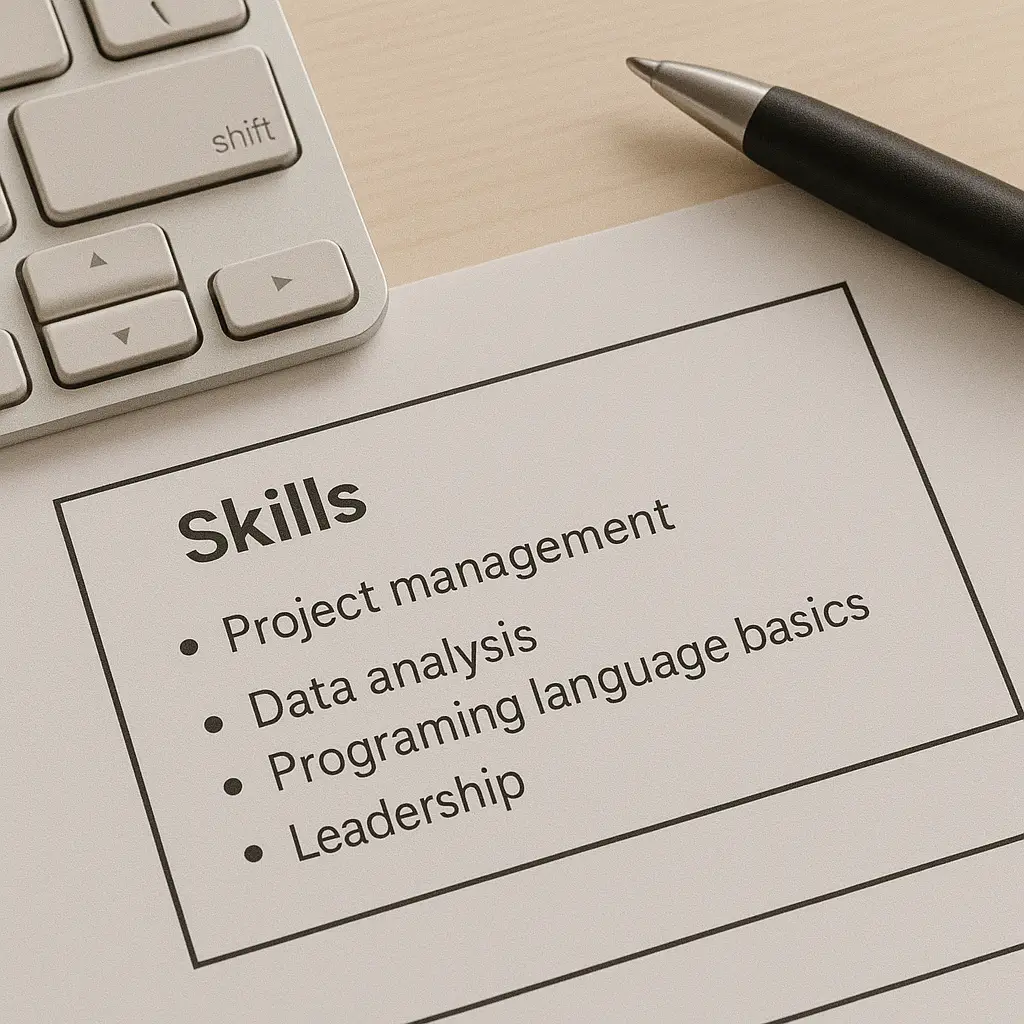
Confidence in your career comes from recognizing and communicating your strengths.
- Transferable skills: project management, leadership, communication, data analysis, and problem-solving often carry more weight than narrow technical skills.
- Build an identity capital inventory—list achievements and highlight work experience that shows how you solve problems.
- Update your personal brand across LinkedIn, CVs, and networking conversations.
- Refresh your résumé’s skills section with both long-term expertise and short-term learning updates.
Tip: Create a 30-day plan with confidence-building actions: apply to 3 roles weekly, schedule 1 networking call, complete 1 online course.
Overcoming Ageism at Work
- Reframe your experience: present yourself as a mentor-learner hybrid—experienced but adaptable.
- Anticipate age-related questions: practice answers that highlight specific skills, energy level, and resilience.
- Leverage your network—many midlife professionals land opportunities through trusted referrals, not cold applications.
Learning & Reskilling at Midlife
Confidence increases when you feel future-proof.
- Short courses: free or low-cost platforms (Coursera, LinkedIn Learning) provide industry-specific updates.
- Certifications: choose ones relevant to your career pivot—digital marketing, project management, or programming language basics.
- Mentorship: seek both senior and younger mentors—cross-generational exchange boosts self-esteem.
Additional focus: Modern skills for today’s job market
Employers value adaptable candidates who pair long-term work experience with short-term learning. Adding even one programming language or online course to your résumé shows you are still competitive in the job market.
Body Confidence and Lifestyle Shifts After 40
Confidence building after 40 isn’t just about mindset—it’s also about how you feel in your body. Hormonal changes, slower metabolism, and fluctuating energy levels can impact self-esteem.
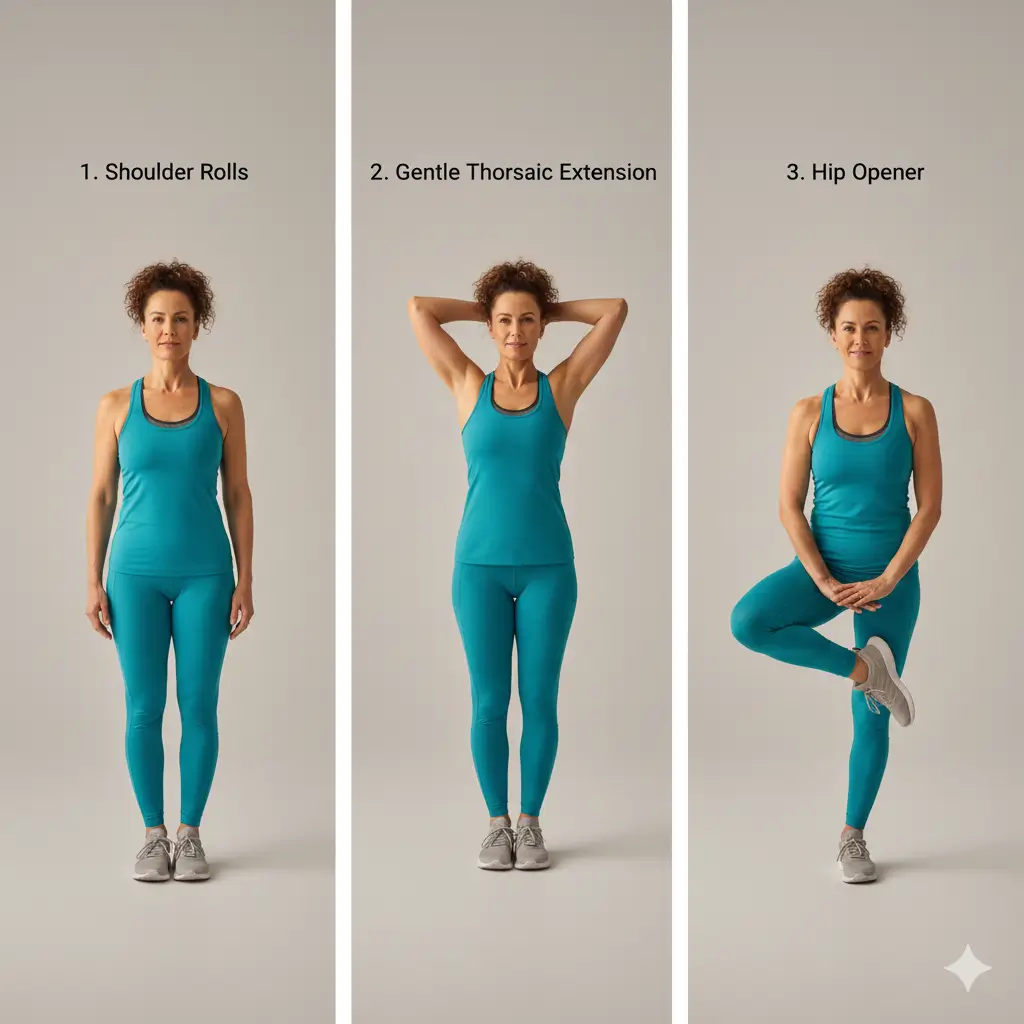
Exercise for Posture and Strength
- 15-minute posture routine: cat-cow stretches, shoulder rolls, hip openers.
- Strength training twice a week: squats, planks, and resistance bands improve bone health and resilience.
- Cardio intervals or daily walking: regulate blood sugar, reduce stress, and support mood.
Nutrition and Energy Levels
- Prioritize protein at every meal (25–40 g).
- Add whole grains, leafy greens, and omega-3s.
- Limit alcohol and refined sugar to avoid energy crashes.
- Stay hydrated to maintain focus and steady energy.
Refreshing Your Style
- Audit your wardrobe and let go of pieces that no longer feel like you.
- Invest in a few versatile outfits that enhance body image.
- Grooming, skincare, and accessories that reflect vitality support self-confidence.
When your body feels strong, your energy level is stable, and your personal style matches your identity, self-confidence becomes easier to sustain.
Therapy and Psychology Tools for Midlife Confidence
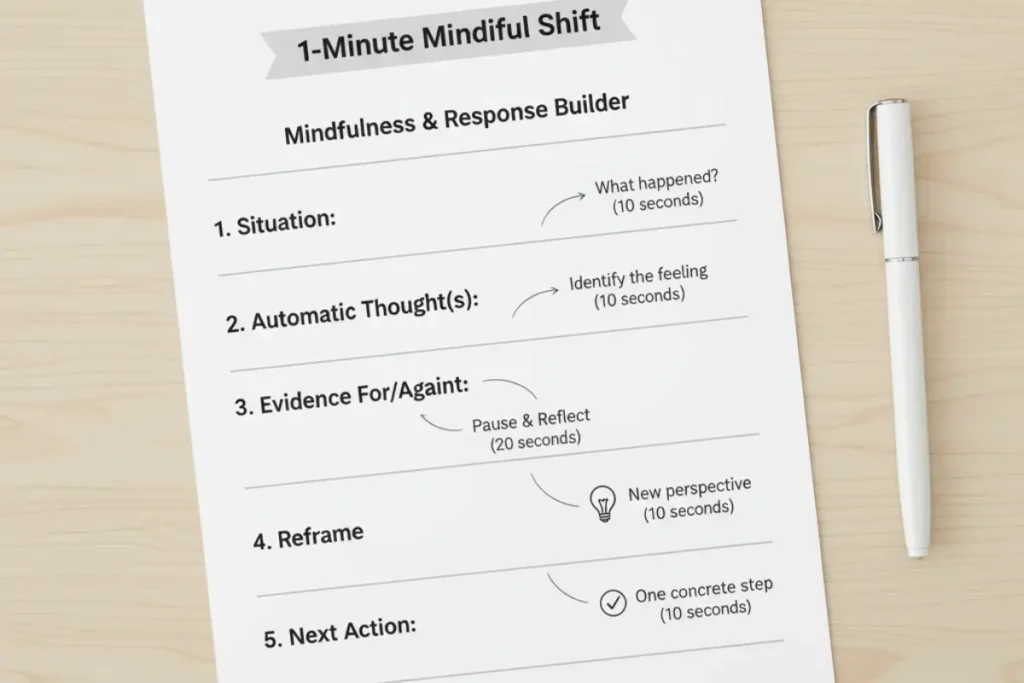
Sometimes the best way to grow confidence after 40 is by strengthening your inner world. Protecting mental health makes confidence sustainable.
CBT for Reframing Limiting Beliefs
- Identify negative self-talk and challenge it with evidence.
- Replace “I can’t learn” with “I can build my skill set through short-term training.”
- Gradually face situations that trigger doubt to prove capability.
Mindfulness and Self-Compassion
- Practice 5–10 minutes of meditation daily.
- Speak to yourself with the same kindness you’d offer a friend.
- Keep a gratitude list to reframe setbacks as lessons.
Finding the Right Therapist
- Look for specialists in midlife transitions, job search stress, or identity crises.
- Explore group programs or short-term workshops for accountability.
- Online therapy platforms make industry-specific support more accessible.
Therapy builds resilience, ensures mental health protection, and makes confidence-building after 40 a long-term investment.
Why the 40s Can Be the Best Years of Your Life
Many see their 40s as a crossroads, but with the right tools, it becomes a launchpad. Confidence building after 40 is about shaping what’s next.
Why 40 Is a Turning Point
- Tested career paths, relationships, and values give clarity.
- Boundaries are stronger, reducing wasted energy.
- Financial maturity provides choice and security.
Myths About Aging & Confidence
- “40 is too late to start over.” → Wrong. Midlife reinvention is common.
- “Appearance is everything” → In reality, health, posture, and vitality matter more than body weight alone.
- “Confidence decreases with age.” → Studies show resilience and assurance often peak in the 40s and 50s.
Transforming Your Life at 40+
- Revisit passions you once set aside.
- Mentor others to reinforce your own skills.
- Learn a new language, skill set, or fitness routine.
- Surround yourself with people who uplift and challenge you.
When you focus on what you can create instead of what you’ve lost, midlife becomes a season of growth.
At What Age Does Self-Esteem Peak?
Research shows confidence building after 40 often aligns with natural growth in self-esteem. Studies suggest it peaks in the late 40s or early 50s before stabilizing.
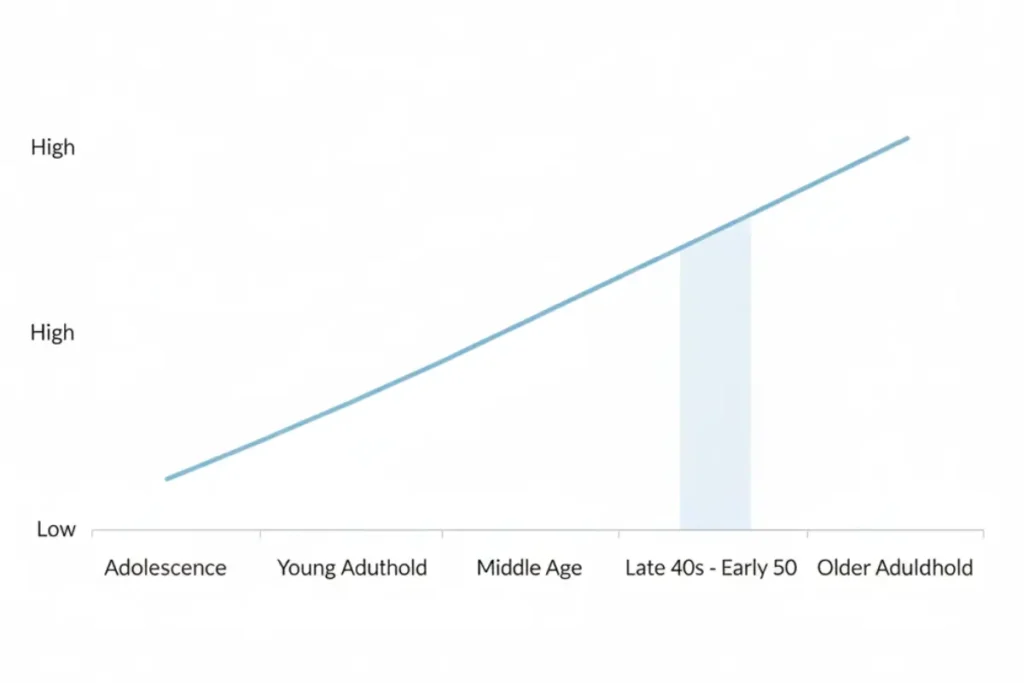
Does Confidence Decrease with Age?
Not automatically. It may dip if health declines, mobility decreases, or social isolation increases. But with continuous learning and social connection, many people grow more confident with age.
How to Keep Growing Confidence Beyond Your 40s
- Commit to lifelong learning—online courses or certifications signal adaptability.
- Maintain physical activity to strengthen body and mind.
- Nurture connections through mentoring and volunteering.
- Define long-term purpose to fuel resilience.
Confidence doesn’t fade—it matures when supported by purposeful habits.
FAQs on Confidence After 40
Yes. By building habits, updating skills, and protecting mental health, confidence often grows stronger in midlife.
Common reasons: hormonal changes, body image issues, ageism, or job market shifts. Solutions include physical activity, therapy, and reskilling.
Yes. Hormonal shifts impact sleep, mood, and energy levels. Confidence can be rebuilt through improved sleep hygiene, a balanced diet, and mindfulness practices.
Clarify your values, refresh your skills, and create a structured job search plan that includes both short-term wins and long-term growth.
Self-esteem often peaks in the late 40s or early 50s due to clarity, resilience, and work experience.
Confidence isn’t a disease, but it can be rebuilt through therapy, exercise, and consistent practice.
Competence, confidence, and connection—developing these areas builds sustainable self-esteem.
Final Thoughts — Confidence Is a Skill, Not an Age
Confidence building after 40 is not about recapturing youth—it’s about using your experience, refining your skills, and protecting your mental health to live authentically.
Key takeaways
- Small daily routines reinforce self-confidence.
- Career pivots are possible with specific skills, online courses, and refreshed résumés.
- Body image improves through strength training, stable blood sugar, and style alignment.
- Protecting mental health ensures confidence is sustainable long-term.
Confidence is practiced, not fixed. Start with one step today, whether that’s a walk, a journal entry, or enrolling in an online course. Over time, these actions become the foundation for lasting confidence.